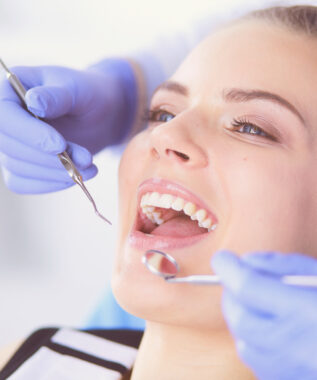 Bruxism, or chronic teeth-grinding, is a more common problem than many people realize. It can also occur in various forms, such as daytime and nighttime bruxism, that might make identifying the problem on your own more difficult. For example, if you have nighttime bruxism, it means the problem of constantly grinding your teeth occurs most often while you sleep at night. Not only will you fail to notice the problem, but it can also have enough time to lead to more significant tooth damage by the time you identify it and seek treatment.
Bruxism, or chronic teeth-grinding, is a more common problem than many people realize. It can also occur in various forms, such as daytime and nighttime bruxism, that might make identifying the problem on your own more difficult. For example, if you have nighttime bruxism, it means the problem of constantly grinding your teeth occurs most often while you sleep at night. Not only will you fail to notice the problem, but it can also have enough time to lead to more significant tooth damage by the time you identify it and seek treatment.
Your teeth feel increasingly more sensitive
While you may not notice that you grind your teeth at night, your teeth will still suffer the consequences from it. As the problem develops and continues, you may notice your teeth becoming increasingly more sensitive. This can be mainly due to the wearing down of the tooth enamel at their chewing surfaces, resulting from the constant pressure and friction of grinding against each other each night. The sensitivity may seem minor at first, but as your bruxism leads to more significant tooth wear and damage, the discomfort can also become increasingly more intense.
You have frequent headaches in the morning
The pressure that your bite exerts when you grind your teeth can be immense, which is partly why bruxism can lead to tooth wear and damage rather quickly. This is also why you may experience other symptoms due to nighttime bruxism, including frequent headaches or migraines when you wake up in the morning. The force of your bite is generated in your jaw’s joints and muscles, and as they overwork themselves throughout the night, they can begin to aggravate the nearby nerve group that travels through most of your craniofacial structures. Chronic headaches, along with sensitive teeth and other related symptoms, may be alleviated with appropriate bruxism treatment.
Your jaw joints and muscles feel sore
The stress and tension that bruxism puts your jaw joints and muscles through can overtax them quickly, and addition to causing headaches, this may also lead to a jaw dysfunction known as TMJ disorder. This describes damage, inflammation, or other forms of harm to one or both of your temporomandibular joints (TMJs) that control your jaw’s movement. At first, you may feel pain and soreness in your TMJs and jaw muscles, which can grow increasingly worse as your bruxism and TMJ disorder progress.
Learn how to address nighttime bruxism
If you grind your teeth constantly while you sleep at night, then you may benefit from custom-designed treatment for nighttime bruxism. To learn more, schedule an appointment with us by calling Dreem Dentistry in Leawood, KS, today at 913-681-5500. We also serve patients who live in Overland Park and all surrounding communities.






